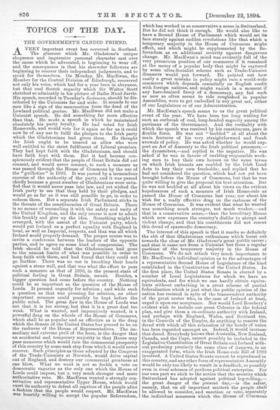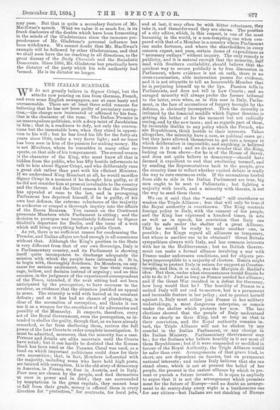TOPICS OF THE DAY.
THE GOVERNMENT'S CANDID FRIEND.
A VERY important event has occurred in Scotland. The glamour which Mr. Gladstone's unique eloquence and impressive personal character cast over the cause which he advocated, is beginning to wear off, and the consequence is that his shrewder followers are beginning to recover their independent judgments, and to speak for themselves. On Monday, Mr. MacEwan, the Member for the Central Division of Edinburgh, recovered not only his voice, which had for a year been in abeyance, but that cool Scotch sagacity which Sir Walter Scott sketched so admirably in his picture of Bailie Nicol Jarvie. His speech, recorded in Tuesday's Scotsman, should be dis- tributed by the Unionists far and wide. It sounds to our ears like a sign of the resurrection from the dead of the Lowland political genius. Mr. MacEwan did not make a Unionist speech. He did something far more effective than that. He made a speech in which he maintained absolutely his party loyalty. He had voted for Irish Home-rule, and would vote for it again so far as it could now be of any use to fulfil the pledges to the Irish party which the Gladstonians had given them. He thought the Irish ought to be treated as allies who were well entitled to the strict fulfilment of Liberal promises. They had kept faith with the Gladstonians, and should have faith kept with them. But it had become con- spicuously evident that the people of Great Britain did rot consent, and would never consent, to such a measure as was passed through the House of Commons by the use of the " guillotine" in 1893. It was passed by ft tremendous exercise of the authority of the party, and it was passed chiefly because a great number of Gla,dstonians were sat is- fled that it would never pass into law, and yet wished the Irish party to see that they held by their pledges, and would go as far as it was still possible to go, in order to redeem them. But a separate Irish Parliament sticks in the throats of the constituencies of Great Britain. There is no means of reconciling it with the safety and unity of the United Kingdom, and the only course is now to admit this frankly and give up the idea. Something might be arranged, with the assent of the Unionist party, which would put Ireland on a perfect equality with England in local, as well as Imperial, respects, and that was all which Ireland could properly demand. The proper course was to invite a conference between the leaders of the opposite parties, and to agree on some kind of compromise. The Irish should be told that the Gladstonians had gone to the utmost limits of what was possible in order to keep faith with them, and had found that they could not go further. There was no use in knocking their heads against a stone wall, and that was what the effort to pass such a measure as that of 1893, in the present state of political feeling in Great Britain, meant. Besides, a bigger question had come before the country. Nothing could be so important as the question of the House of Lords. It pressed urgently for solution ; and while such a question as that was pressing for solution, no other important measure could possibly be kept before the public mind. The great flaw in the House of Lords was not that it is too strong, but that it is a great deal too weak. What is wanted, and imperatively wanted, is a powerful drag on the wheels of the House of Commons, which shall be as popular and as effective as is the drag which the Senate of the United States has proved to be on the rashness of the House of Representatives. The im- mediate and extreme peril of the hour, is the danger that an accidental and temporary majority in that House may pass measures which would ruin the commercial prosperity of this country by some rash step from which it would never recover. Such principles as those adopted by the Congress of the Trade-Unionists at Norwich, would drive capital out of England, and destroy our commercial greatness at one blow. What we want is not so feeble a veto on democratic vagaries as the only one which the House of Lords could impose, but a very much stronger and more authoritative veto. Mr. MacEwan wanted a strongly con- servative and representative Upper House, which would exert its authority to defeat all caprices of the people after a fashion that the people would respect. Mr. MacE wan was heartily willing to accept the popular Referendum, which has worked in so conservative a sense in Switzerland. But he did not think it enough. He would also like to have a Second House of Parliament which would set its face sternly against sudden revolutions like that which a temporary majority in the House of Commons might effect, and which might be supplemented by the Re- ferendum as an additional security against dangerous change. Mr. MacE wall's mind was evidently full of the- very precarious position of our commerce if it remained at the mercy of a popular body that might be captured by some ultra-Socialist scheme such as Trade-Unionist dreamers would put forward. He pointed out how easily a great mistake in policy might ruin a world-wide commerce which depends essentially on English credit with foreign nations, and might vanish in a moment if any hare-brained fancy of a democracy, any fad such as now so often seems to ride roughshod in popular Assemblies, were to get embodied in any great act, either of our Legislature or of our Administration.
Mr. MacEwan's speech seems to us the great political event of the year. We have been too long waiting for such an outbreak of cool, long-headed sagacity among the partisans of the Government. And the cordiality with which the speech was received by his constituents, gave it double force. He was not " heckled " at all about the main features of his very straightforward and frank avowals of policy. He was asked whether he would sup- port an Act of Amnesty to the Irish political prisoners,— the dynamiters,—and replied in the negative. He was asked if he was in favour of enabling responsible work- ing men to buy their own houses on the same terms on which Irish tenants are enabled by the Irish Land Acts to buy their own freeholds ; and replied that he had not considered the question, which had not yet been brought before the House of Commons, but that he was quite willing to give the proposal his best attention. But he was not heckled at all about his views on the evident hopelessness of such a measure of Irish Home-rule as passed the House of Commons last year, nor about his wish for a really effective drag on the rashness of the House of Commons. It was evident that what he wanted was something much stronger, not much weaker,—and that in a conservative sense,—than the hereditary House which now expresses the country's dislike to abrupt and violent change, and that his constituents did not resent this dread of spasmodic democracy.
The interest of this speech is that it marks so definitely the ebb of that Gladstonian enthusiasm which burst out towards the close of Mr. Gladstone's great public career ; and that it came not from a Unionist but from a regular partisan of the temporary majority in the House of Commons. We do not attach very much importance to Mr. MacEwan's individual opinion as to the advantages of a representative Second House of Legislature of the kind established in the Constitution of the United States. In the first place, the United States Senate is elected by a number of Local Legislatures for which we have no equivalents, and for which we can hardly obtain equiva- lents without embarking in a great scheme of partial federalisation which is just what the public opinion of the nation has resisted in spite of the transcendent authority of the great orator who, in the case of Ireland at least, urged it upon our acceptance. Nor would Lord Rosebery's evident wish to include our great Colonies in the federal plan, and give them a co-ordinate authority with Ireland, and perhaps with England, Wales, aud Scotland too, in the Councils of the Empire, do anything to remove the dread with which all this relaxation of the bonds of union has been regarded amongst us. Indeed, it would increase that dread. Everybody knows that Australia, New Zealand, Canada, and the Cape, cannot possibly be included in the Legislative Constitution of Great Britain and Ireland with- out producing precisely the same class of dangers, in an exaggerated form, which the Irish Home-rule Bill of 1893 involved. A United States Senate cannot be reproduced in this cou ntry, and any other form of representative Assembly would be only too likely to result in a deadlock, or possibly even in rival schemes of perilous political enterprise. For our own part we stick to the notion that the security which Switzerland has adopted against political log-rolling,--- the great danger of the present day,—is the safest, namely, that on all important matters the people shall be allowed to consider, and sanction or veto, separately the individual measures which the House of Commons may pass. But that is quite a secondary feature of Mr. and at last, it may often be with bitter reluctance, they MacEwan's speech. What we value it so much for, is its take it, and thenceforward they are slaves. The position frank disclosure of the doubts which have been fermenting of a city editor, which, in this respect, is one of the most in the minds of the Gladstonians since the immense pre- harassing in the world, is a non-tempting one when com- ponderance of Mr. Gla,c1stone's personal influence has pared with that of a Member in a country where Parliatneet been withdrawn. We cannot doubt that Mr. MacEwan's can make fortunes, and. where the shareholders in every example will be followed by other Gladetonians, and that concern expect, and pass, certain items of expenditure as we shall soon have the ice cracking in all directions, to the " necessary outlays " without inquiry. The only remedy is great dismay of the Daisy Chroaide and the Socialistic publicity, and it is natural enough that the minority, half Democrats. Since 1886, Mr. Gladstone has practically been mad with Southern excitability, should believe that the the dictator of the party which his sole authority had quickest way to secure publicity is by free discussion in


































 Previous page
Previous page